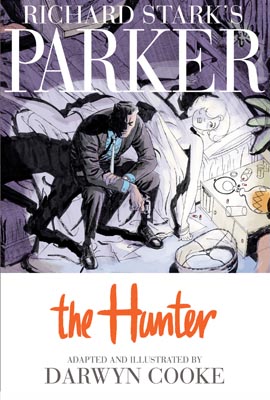- Comics
- Comics Reviews
- Manga
- Comics Reviews
- European Comics
- News
- Comics News
- Press Releases
- Columns
- Spotlight
- Digital Comics
- Webcomics
- Cult Favorite
- Back Issues
- Webcomics
- Movies
- Toys
- Store
- More
- About
By Leroy Douresseaux
July 12, 2009 - 13:02
 |
| The Hunter cover image |
When IDW announced in 2008 that acclaimed comic book creator Darwyn Cooke (DC: The New Frontier, The Spirit) was adapting four of author Donald E. Westlake’s “Parker” books as graphic novels, fans were excited. This was probably especially true of readers looking forward to what would hopefully be a great crime comic book. With the release of the first Parker graphic novel, The Hunter, crime comics fans will get their wish, but The Hunter is not just a fine crime comic book, it’s an outstanding comic book.
Westlake wrote the Parker novels under the pseudonym Richard Stark, and The Hunter, published in 1962, was the book that introduced the enduring, ruthless career criminal, Parker (whose first name is never mentioned in any of the 24 “Parker” novels). In his adaptation, Cooke remains faithful to the original novel’s uncomplicated plot.
Parker arrives in New York City with a head of steam, as he scams and schemes his way to a little financial stability. He only needs a little stability, just enough to begin to get payback. Parker’s mission begins the woman who betrayed him – the woman who shot Parker just above the belt and left him for dead – his wife Lynn Parker. She’s the key to Parker discovering the whereabouts of Mal Resnick, the partner who double-crossed him after a successful heist. Parker, however, wants more than to just coldly exact revenge; he also wants back everything that was taken from him, including the money Resnick stole from him, and that will pit Parker against Resnick’s employers, The Outfit.
Is The Hunter a great crime comic? It certainly could be considered as such. Is it a faithful adaptation of the source? Yes, it is – quite so, but The Hunter is something else, also. It’s a terrific comic book, plain and simple. Darwyn Cooke has taken Westlake’s first Parker novel, a story that has already been told, and Cooke retells it in a new voice. This is Cooke’s voice – the graphic novel as only he can do it. Cooke blends words/text, pictures in sequence, portraits, cityscapes, and single illustrations into a graphic work that does more than just adapt The Hunter into comics form. It is something new; it is Parker and his world as they’ve never before been.
With modern crime comics, sometimes the emphasis is either on drawing stylish art that will have a “film noir feel” (even in full-color crime comics) or stories that “play with crime genre conventions.” Cooke’s The Hunter is certainly visually stylish. The elements of line, shape, value, texture, and color are hardboiled. In terms of components and principles of art, Cooke’s work here has a passing resemblance to the comics of Will Eisner and Alex Toth, both noted for their cinematic visual motifs. However, ultimately the art direction, graphic design and composition, both as style and as storytelling, make The Hunter something different. Whereas other creators may be concerned about crime comics that have a general visual style or specific narrative conventions, Cooke reaches beyond convention simply to tell a great story with wide appeal.
The parts of Westlake’s text that Cooke uses as word balloons and in captions, he also brings to life with his art. The art establishes story, especially the first 24 pages, in which Cooke efficiently reveals to the reader Parkers abilities and his aptitude as a criminal.
Cooke detailed renderings of New York City, 1962, brings us to a hustling, diverse city of distinct locales and varied local colors. From the bustle of the subway to greasy diners manned by saucy waitresses, Cooke establishes the world in which Parker will make his long, slow, but relentless climb up the hill to revenge. Look at this book long enough and it is obvious that Cooke put so much thought into creating The Hunter’s environments via art direction and set decoration. There’s the cool, ultra-modern of Lynn Parker’s apartment, bought with ill-gotten gains. That actually pales next to the spotless, space-age elegance of the lobby at Frederick Carter Investments. Whatever the setting, Cooke’s deft touch at fashioning the milieu of Parker’s world brings the story alive and brings the reader into that world.
Ultimately, The Hunter will be judged on how well Cooke tells a story, more so than on how pretty the art looks or how much the art fits a genre. Every panel and every page connects in one fantastic tale of a man who simply wishes to balance the scales in his favor. Yeah, Parker is a ruthless criminal and murderer, but in the world in which he lives, he earned what is his. All he wants to do is get that back.
Decades ago, Donald Westlake began an epic journey convincing readers that Parker was doing the right thing as Parker saw it, and that first book, The Hunter, was a terrific book of crime fiction. Nearly 50 years later, Cooke retells that story in his own unique voice, and as expected, Darwyn Cooke’s The Hunter is a superb comic book – in whatever genre one might place it. It is a graphic novel better than most and as good as the best.
A+